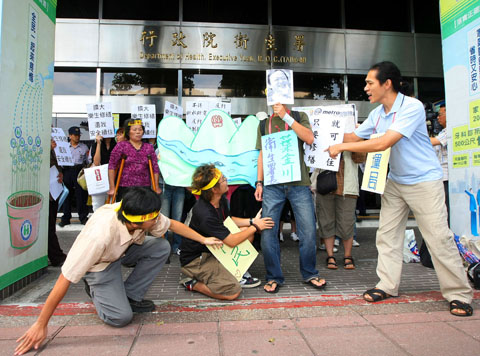Losheng Sanatorium (Happy Life, 樂生療養院) preservationists demonstrated outside the Department of Health (DOH) yesterday, asking Department of Health Minister Yeh Ching-chuan (葉金川) — who once criticized the decision to evict Losheng residents as the “wrong policy” — to help residents stay in their homes.
“No to forced eviction!” “Yeh Ching-chuan, please save Losheng!” demonstrators from the Youth Alliance for Losheng and Losheng Self-help Organization shouted.
The sanatorium in Taipei County is a complex of buildings built during the Japanese colonial era to isolate people with Hansen’s disease — also known as leprosy — which was believed to be highly contagious at the time.

PHOTO: CNA
After the sanatorium’s campus was selected as the site for a Mass Rapid Transpit (MRT) maintenance depot, the government built a high-rise hospital-like building nearby and asked residents to move there.
Preservationists who consider the issue to be both a human rights violation and the destruction of historic buildings have been fighting for Losheng’s preservation for nearly four years.
Although the government later came up with a solution to preserve 40 of the Losheng buildings, while promising to reconstruct the nine that will be torn down, the Department of Rapid Transportation Systems (DORTS) said earlier that 25 out of the 40 buildings to be preserved would still be threatened.
“Despite the government’s promise to preserve 40 buildings, DORTS is still asking residents in the 25 buildings that could be damaged during the construction to move out, unless the DOH would repair them, and that’s why we’re here today,” an alliance member surnamed Liao (廖) said.
“What DORTS is doing is still forced eviction because the 15 buildings that would be completely safe to stay in [during the MRT construction] include kitchens and bathrooms [so there would not be enough rooms for all the residents,” Losheng Self-help Organization chairman Lee Tien-pei (李添培) said. “We therefore ask the DOH, which is in charge of the sanatorium, to help us, especially when Minister Yeh has openly criticized the Losheng policy in the past.”
In an April 3, 2006, interview with the Chinese-language Liberty Times (the Taipei Times’ sister newspaper), Yeh, then running in the Chinese Nationalist Party (KMT) primary for Taipei City mayor, was quoted as saying that the “Losheng Sanatorium is a good example of an incorrect policy ...what [Losheng residents] need is a good place on the hill with creeks surrounding it to spend the rest of their lives — of course they’d protest when the government gives them a high-rise hospital-like building and forcibly moves them. Of course the policy is not feasible, because it’s the wrong one.”
As Yeh was not in his office yesterday, executive director of the hospital management office Hwang Kung-chang (黃焜璋) accepted the protesters’ petition and promised to take it to Yeh. The protesters vowed to come back if the department does not answer their demands.

A magnitude 4.9 earthquake struck off Tainan at 11:47am today, the Central Weather Administration (CWA) said. The hypocenter was 32.3km northeast of Tainan City Hall at a depth of 7.3km, CWA data showed. The intensity of the quake, which gauges the actual effect of a seismic event, measured 4 in Tainan and Chiayi County on Taiwan's seven-tier intensity scale, the data showed. The quake had an intensity of 3 in Chiayi City and County, and Yunlin County, while it was measured as 2 in Kaohsiung, Nantou County, Changhua County, Taitung County and offshore Penghu County, the data showed. There were no immediate reports of

‘DENIAL DEFENSE’: The US would increase its military presence with uncrewed ships, and submarines, while boosting defense in the Indo-Pacific, a Pete Hegseth memo said The US is reorienting its military strategy to focus primarily on deterring a potential Chinese invasion of Taiwan, a memo signed by US Secretary of Defense Pete Hegseth showed. The memo also called on Taiwan to increase its defense spending. The document, known as the “Interim National Defense Strategic Guidance,” was distributed this month and detailed the national defense plans of US President Donald Trump’s administration, an article in the Washington Post said on Saturday. It outlines how the US can prepare for a potential war with China and defend itself from threats in the “near abroad,” including Greenland and the Panama

The Chinese Nationalist Party (KMT) is maintaining close ties with Beijing, the Democratic Progressive Party (DPP) said yesterday, hours after a new round of Chinese military drills in the Taiwan Strait began. Political parties in a democracy have a responsibility to be loyal to the nation and defend its sovereignty, DPP spokesman Justin Wu (吳崢) told a news conference in Taipei. His comments came hours after Beijing announced via Chinese state media that the Chinese People’s Liberation Army’s Eastern Theater Command was holding large-scale drills simulating a multi-pronged attack on Taiwan. Contrary to the KMT’s claims that it is staunchly anti-communist, KMT Deputy

RESPONSE: The government would investigate incidents of Taiwanese entertainers in China promoting CCP propaganda online in contravention of the law, the source said Taiwanese entertainers living in China who are found to have contravened cross-strait regulations or collaborated with the Chinese Communist Party (CCP) could be subject to fines, a source said on Sunday. Several Taiwanese entertainers have posted on the social media platform Sina Weibo saying that Taiwan “must be returned” to China, and sharing news articles from Chinese state media. In response, the Mainland Affairs Council (MAC) has asked the Ministry of Culture to investigate whether the entertainers had contravened any laws, and asked for them to be questioned upon their return to Taiwan, an official familiar with the matter said. To curb repeated